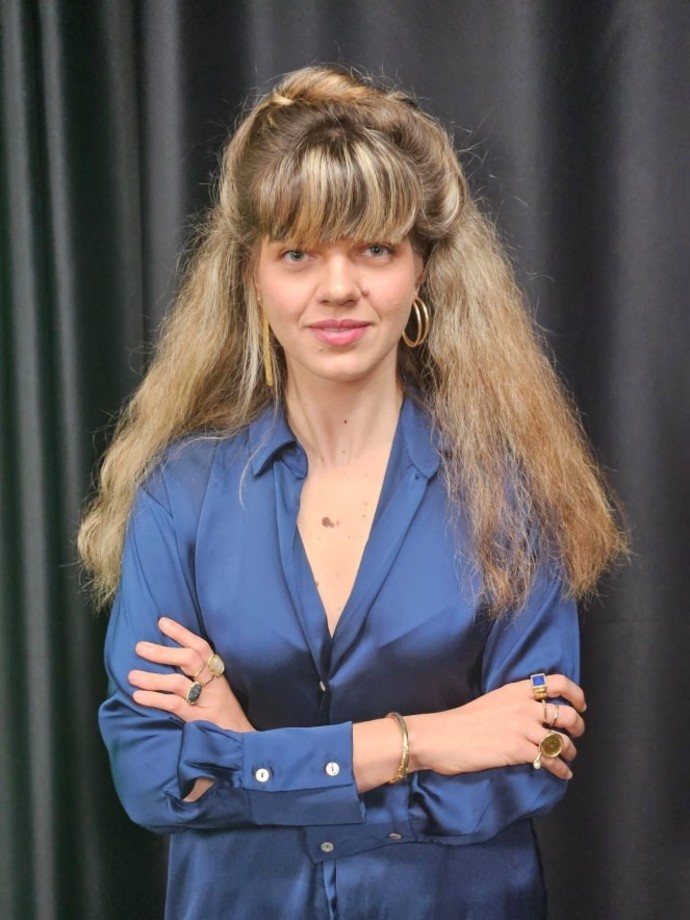This difficult current situation regarding orphanhood in Israel has turned Hadar Kess into an expert on all matters concerning orphans in Israel. Kess, a young Tel-Avivian who celebrated her 24th birthday during the war, found herself building a national emergency plan, advising philanthropic initiatives on orphans issues, and mobilizing resources for the emergency plan she is establishing in her organization, which she founded after her father’s death in a car accident when she was 14. Kess is the founder and CEO of the Sunflowers Association - the only association in Israel for orphaned children and adolescents from civilian casualties. Sunflowers supports over 750 families weekly, operating in more than 30 activity centers across the country, in partnership and funded by the Ministry of Education and local authorities. In addition, the association conducts research on orphanhood and its implications, raising awareness of orphanhood and changing national policy regarding orphaned children and adolescents. Currently, Kess is an MA student at Tel Aviv University, studying public policy. Due to her public endeavors, Kess was selected as one of the 60 most influential women in Israel by Globes magazine, one of the 30 promising young people in Israel by Forbes magazine, one of the 40 heroes of the year by Channel 12, and one of the 125 promising Zionist leaders by the Jewish Agency.
“On the morning of October 8th, I started receiving calls from government offices,” Kess tells us. “Government offices had a wide variety of needs, and they needed assistance from us to save them the trouble of reaching the field many times. At the beginning of the war, there was immense chaos, both in the governmental and human aspects. We were faced with stories we never thought we would encounter, of children witnessing the murder of their parents in front of their eyes. At first, we started dealing with the situation by providing tools for teachers and counselors at the Ministry of Education, then we assisted the Ministry of Welfare, and unfortunately, also the captive team,” Kess recounts, as there were children who returned from captivity and needed to be informed that their parent was no longer there.

“Simultaneously, we began to receive requests from the families themselves and from children who lost a parent or both parents and were desperate for help through our unique model at Sunflowers. These children suffer from complex trauma; often, they themselves experienced the horrors of war. Their exposure to horrifying events, the existential fear, loss of their homes, schools, social circles, separation from family members, and even further loss of additional family members - all contribute to a complex trauma that manifests itself in various forms of grief, unlike anything we’ve ever seen before.”
Kess realized that they needed to support them uniquely. “War orphans are already integrating into our existing activity centers throughout the country, accompanied by a trauma specialist who advises us on these complex cases. In addition, we are working towards the establishment of 5 new centers that will operate in the southern area of the country, in places like Ofakim and Sderot,” Kess says. She tells us that “On Eli Cohen Street in Ofakim, there are 38 new orphaned children as a result of the massacre that took place on October 7th. We must help these children daily; our unique treatment model will provide them with emotional support and a group of equals. It will be a response that will also provide their remaining parent/guardian with significant assistance and a comprehensive emotional and social support array, allowing them to live alongside the grief and develop resilience for themselves and for their children.”
For this endeavor, Kess had already secured approximately one million dollars from philanthropic organizations from Israel and around the world – such as the New York Federation, the JFNA, the Russell Berrie Foundation, the Schusterman Foundation, the Arison Foundation, the Yad-Hanadiv Foundation, the Shashua Family Foundation, the Azrieli Foundation, and others. However, in order to provide support to all of the orphans, Kess explains, an additional half a million dollars are still needed. Sunflowers is determined to be a beacon of hope for these children who have experienced such a terrible tragedy at such a young age.
Kess tearfully recounts the story of Roni and Rotem (pseudonyms), orphans of October 7th who take part in one of the existing centers of the association in the country: “A while ago, a brother (Roni, 10) and a sister (Rotem, 12) joined one of our centers. On October 7th, their father was at the Nova festival. They woke up that morning and started to understand what was happening; their mother tried to call their father, but he didn’t answer. For seven days, they didn’t know what had happened to him until they were told that he had been murdered. His body was found in a shelter in the area, in which he probably tried to hide. Their mother told me that Rotem doesn’t talk about her father at all; on the other hand, Roni’s first sentence when he came to the activity was, ‘My father was murdered.’ In one of the meetings, regarding coping tools, I asked the children to bring to the activity an item they thought could help them cope. Roni brought a toy gun and said he would use it to protect his family from Hamas. In another meeting, I asked them to bring pictures of themselves as children. Rotem brought a picture with her father and gave it to me. When Roni saw the picture in my hand, he tried to grab it and cried, ‘Give me back my father.’” Kess notes that this is just one story of two children, out of 650 new orphaned children since October 7th. “These are orphaned children that as human beings and as Jews particularly, it is our duty to take care of them. Orphaned children whose fate we have the power to turn from lost to hopeful, children that it is our obligation not to forsake again.”
